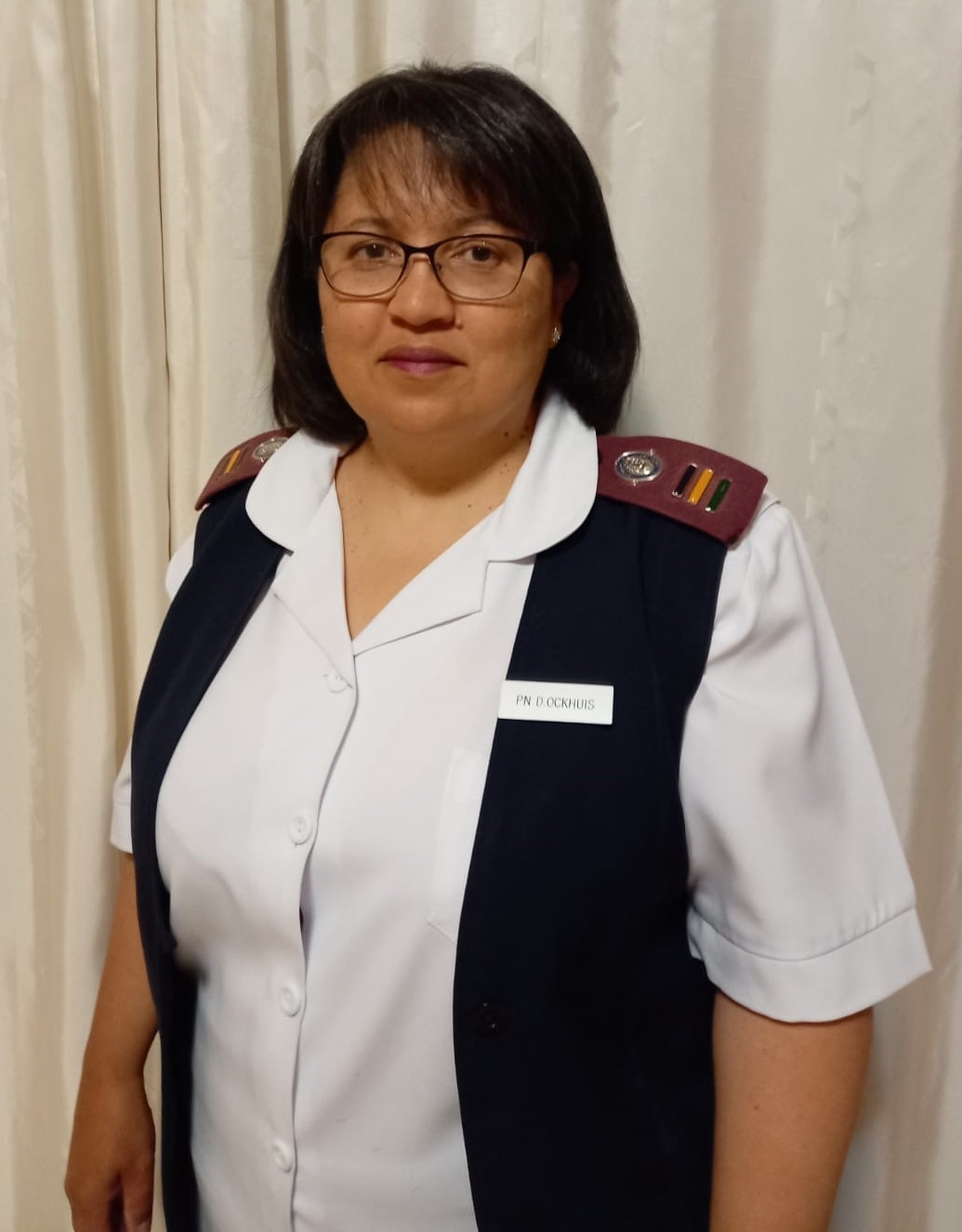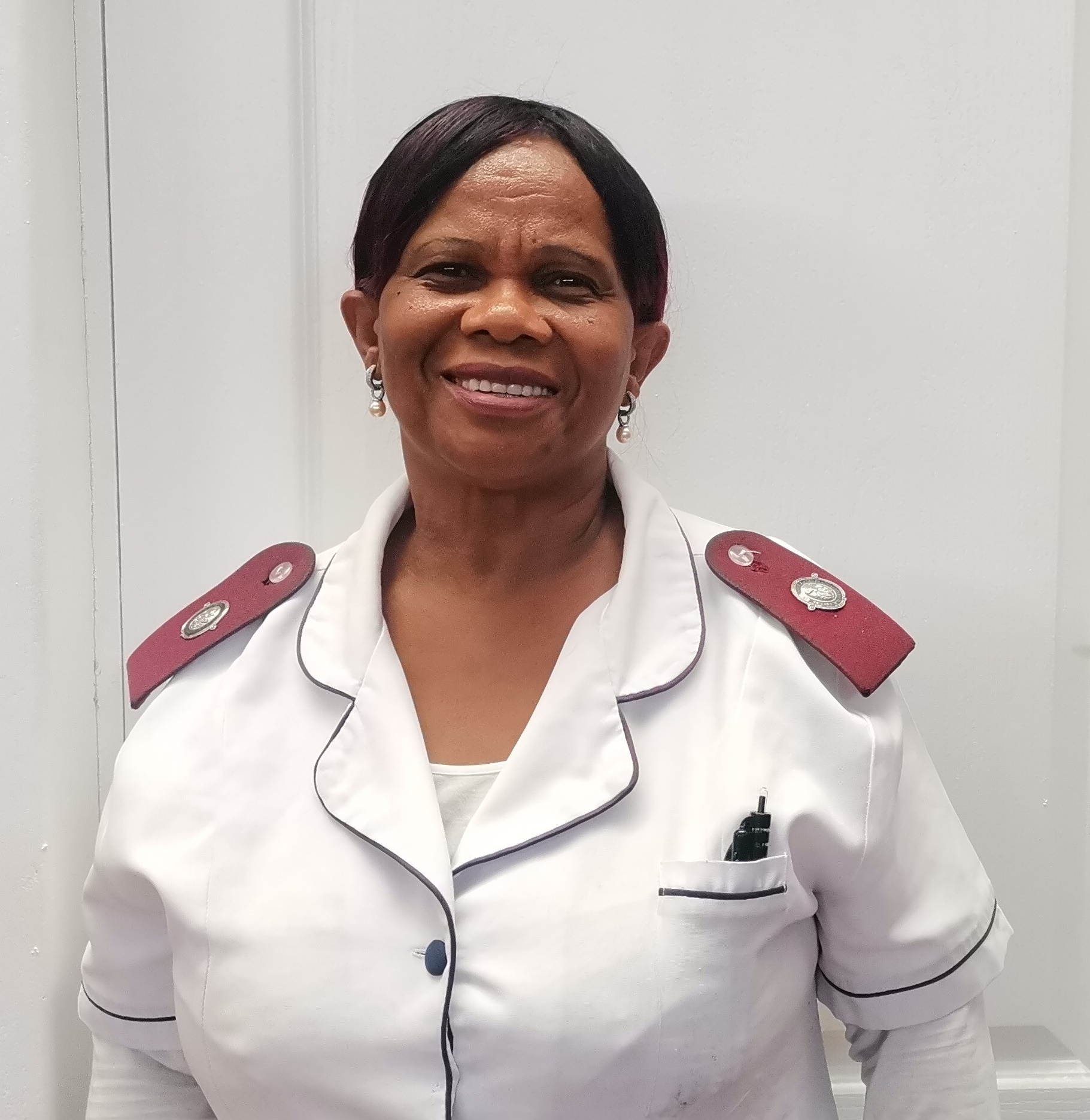
News
‘Healthcare on wheels’ brings hope, comfort to patients and families
Being diagnosed with a life-threatening illness or life-limiting condition can be frightening for patients and their families. Nurse Daphne Ockhuis knows first-hand how hard it is to navigate feelings of grief after a loved one’s diagnosis and the difference palliative care services can make.
To mark World Hospice and Palliative Care Day on 8 October this year, palliative care nurses are sharing their experiences, with the hopes of raising awareness on the importance of specialist palliative care for people of all ages.
In 2019, Sr Ockhuis, who works in the Kraaifontein community, had to come to terms with her father’s stage 4 lung cancer diagnosis. During this time, she shares that she discovered her desire to provide palliative care support to other families. She understood the fears her father and family faced at the time of his diagnosis. Sr Ockhuis has encouraged families to have an open mind about palliative care and what it can mean for their family. “I became involved with palliative care when my father was diagnosed with stage 4 lung cancer. It gave us as a family time to communicate and come to terms with mortality. Palliative care provides people with the opportunity to spend quality time with their loved ones amidst illness and disease. It also helps your family to navigate the health system and reduces stress. This service is close to my heart, and I hope to provide support and comfort to all families who need it. If you or your loved one has been diagnosed with a serious illness, palliative care can help you to manage symptoms of an illness and get your family the help that they need.”
The palliative care service can look different for every patient, but the goal remains the same: to improve the quality of life of patients who are facing daily challenges due to living with a life-threatening illness such as cancer, organ failure, or dementia. However, palliative care is not limited to these conditions. Nurses describe the service as “healthcare on wheels” as it brings services to patients’ doorsteps.
Palliative care services provide relief from pain and other uncomfortable symptoms, such as nausea and vomiting. The service also helps patients and families to understand an illness, reducing mental distress. Your palliative care nurse or community health worker will also ensure that your doctor is aware of any side effects of medication you’re using, and assist with medication delivery.
Sr Ockhuis describes palliative services as an “extra blanket of care”. “Believe it or not, palliative care is an extra blanket of care and is not confined to a hospice building. Despite being a scary thought, palliative care focuses on the holistic management of the patient. This means physically making sure the patient is comfortable, pain free and symptoms well-controlled. Spiritually and emotionally, it means helping them make peace with a difficult diagnosis and prognosis. Palliative care also has long arms as it stretches out to the families of the patients too, in order to make sure that the families are well prepared for what is to come and supported by home-based care staff where necessary. By involving a palliative social worker, the families are counselled.”
Early delivery of palliative care reduces unnecessary hospital admissions and the use of health services. Palliative care involves a range of services delivered by a range of professionals that all have equally important roles to play – including physicians, nursing staff, community healthcare workers, paramedics, pharmacists, dieticians, physiotherapists and volunteers –– all in support of the patient and their family.
WHO QUALIFIES FOR PALLIATIVE CARE?
Any person, of any age, who has a severe, life-limiting, or life-threatening condition qualifies for palliative care. Palliative care is provided for patients with many different conditions or types of illnesses, as well as their families. There are different types of care available. This includes in-hospital care, care at a hospital or clinic, care provided at home, care at an immediate care facility and care services for children.
Should a patient be accepted into a palliative care programme, the care and support of the palliative care team will help the patient and their family deal with the challenges of living with a life-limiting or life-threatening condition.
Palliative care could include the following:
- pain and symptom control,
- psychosocial support and advice,
- spiritual support,
- emotional support,
- bereavement support, and
- loan of equipment (for example wheelchairs, urinals etc).
If you suspect that your loved one needs palliative care support, you can visit your local clinic. This service is free and easily accessible for you.
GRIEF AND BEREAVEMENT SUPPORT
Grief and bereavement support forms part of the palliative care service. Grief is the natural emotional response to loss. Some examples of loss include the death of a loved one and loss of independence through disability. Bereavement, however, is the period of grief and mourning after a death.
When you grieve, it is part of the normal process of reacting to a loss in your life. You may experience grief as a mental, physical, social, or emotional reaction.
Sr Dina Langley works as a palliative care nurse and is based at the St Martín de Porres Catholic Church in Bishop Lavis. She has helped many families navigate loss and encourages families to seek support. When someone experiences loss, they may experience different stages of grief. “As palliative care workers, we are there to support you at every stage and to refer you for mental health support,” says Sr Langley.
Sr Langley says it is important to remember that everyone’s grieving process is different and there is no right or wrong way to grieve.
Some common symptoms of grief include:
- Shock, denial and disbelief.
- Panic and confusion.
- Feeling overwhelmed.
- Difficulty concentrating or remembering things.
- Anger and hostility.
- Withdrawing from others.
- Changes in appetite or sleep patterns.
The grief stages are used to understand the process of grieving. It is common for those who are grieving to experience these emotional reactions. They often do not appear in the order below.
Grief stages:
- Denial
- Anger
- Bargaining
- Depression
- Acceptance
It’s important to recognise when you need help. While grief is a normal experience, it can cause great distress and affect every part of your life. Some signs that you need help include:
- Sleeping problems.
- Feeling as though you want to join the person you have lost.
- Constant or frequent feelings of hopelessness, despair and anger.
- Feeling of constant numbness.
- Anxiety about the people around you dying.
- Unable to live your normal life.
- If you strongly cling to or avoid things which remind you of the lost person.
- Feelings of behaving in ways that could hurt your well-being.
- Refusing to leave home.
- If you want help, this is reason enough to seek it.
FAMILY SUPPORT CRITICAL
Being a carer for someone with a serious condition can be exhausting. A patient's loved ones will be important during this process. Sr Langley encourages family members to support the patient and caregiver(s) living with the patient.
“Our services are not limited to the patient who is ill. We have also ensured that the affected family members are coping. For instance, we may ask the caregiver at home if they’re coping financially. Many times, you find that a child may resign from work to care for their parent. This can add pressure financially. We can assist by referring this family to social development or a social worker for support. At the same time, we may provide counselling to the whole family if we find that a caregiver is not being supported or needs additional support. It’s important that the primary caregiver is not overwhelmed and receives adequate support. This means allowing the caregiver time off. Everyone’s mental health is important is this process.”
Spiritual support is included in palliative care. Sr Langley encourages a family to invite their spiritual leaders to visit the family. “If the family is Christian, this may mean inviting your pastor or priest to pray for the patient. We’ll find out if that patient accepts communion or what their spiritual practices are. These are all ways that we can help the patient and their family to improve their quality of life. We assist residents from different backgrounds and different religious beliefs.”
HOW TO COPE WITH GRIEF
If you or your loved one is struggling, you can visit your nearest clinic for mental health support. There are other ways that you can cope with grief. These steps include:
Talking to someone: Try to stay connected to those around you. Share how you’re feeling.
Exercising: Move your body, get outside.
Look after yourself: Relaxation exercise can help if you are struggling to sleep.
Seek help: Do not hesitate to ask for help if you think you need it. Visit your clinic.
Do not use drugs or alcohol: Make healthy choices to protect you in the long run.
Be kind to yourself: Grieving is not an easy process. Give yourself time to feel better and seek professional support if you feel overwhelmed.
The Mental Health Information Centre is a good source of information in terms of which support groups and additional services exist in your area. You can reach them at 021 938 9229. There are also numerous national acute helplines such as Lifeline 0861 322 322, the Suicide Crisis Line 0800 567 567 and the services offered by the South African Depression and Anxiety Group 011 234 4837.
Learn more the difference between palliative and hospice care, and the different types of care available for you by visiting: www.westerncape.gov.za/general-publication/hospice-and-palliative-care





